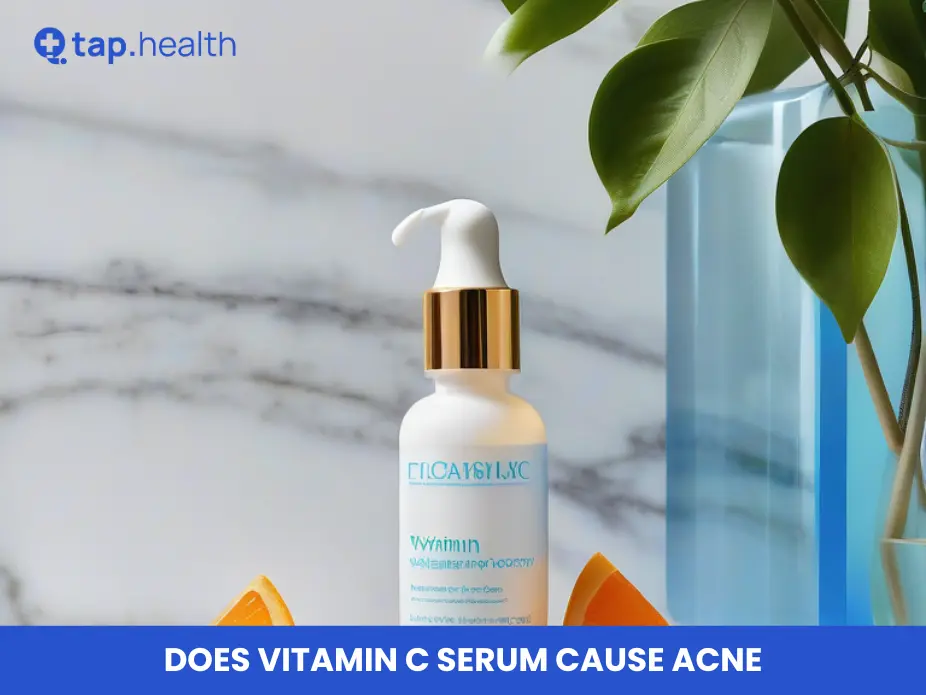Vitamin C serums are popular in the skincare world for their brightening and anti-aging benefits. But some people wonder: Can vitamin C serum cause acne? In this blog post, we’ll explore this question, examine the causes of acne, and dive into the effects of vitamin C on your skin.
What are the Primary Causes of Acne?
Before understanding if vitamin C serum can cause acne, it’s essential to know what triggers breakouts in the first place. Acne is a skin condition when hair follicles become clogged with oil (sebum), dead skin cells, and bacteria. Here are the main factors behind acne:
- Excess Sebum Production: Your skin’s oil glands produce too much sebum, clogging your pores and leading to acne.
- Bacteria: Propionibacterium acnes (P. acnes) bacteria thrive in oily areas, causing inflammation and pimples.
- Clogged Pores: When your skin doesn’t shed dead cells properly, they mix with oil and clog your pores.
- Hormonal Changes: Hormones, especially androgens, increase oil production and can trigger acne.
- Diet and Lifestyle: Foods high in sugar and unhealthy fats, stress, and lack of sleep can worsen acne.
- Certain Medications and Cosmetics: Some drugs and beauty products can clog pores, leading to breakouts.
Understanding these causes helps us identify how external factors, like skincare products, might influence acne formation.
What is Vitamin C?
Vitamin C, also known as ascorbic acid, is a water-soluble vitamin that plays a vital role in your overall health. In skincare, it’s hailed as a potent antioxidant that fights free radicals, reduces dark spots, brightens skin tone, and promotes collagen production. Vitamin C serums, specifically, are designed to deliver concentrated amounts of this vitamin directly to your skin, making them a popular addition to many people’s daily skincare routines.
Can Vitamin C Serum Cause Acne? Let’s Take a Look at the Research!
The short answer is: No, vitamin C serum doesn’t directly cause acne. However, some people report breakouts after using it, and there are several reasons why that might happen.
1. Purging
Vitamin C, especially when combined with other ingredients like retinol or exfoliants, may accelerate skin cell turnover. This can lead to “purging,” a temporary phase where hidden acne comes to the surface before the skin clears up. Purging usually lasts a few weeks but isn’t the same as a typical acne breakout.
2. Wrong Form of Vitamin C:
Not all vitamin C serums are created equal. Some formulations can irritate sensitive skin, leading to redness, bumps, or breakouts. The most commonly used form is L-ascorbic acid, which can be harsh if your skin is prone to irritation.
3. Other Ingredients in the Serum:
Sometimes, it’s not the vitamin C itself causing the problem but other ingredients in the product. Look for serums with simple, non-comedogenic (non-pore-clogging) ingredients. If a serum contains oils, silicones, or fragrances, these may contribute to clogged pores or irritation, which can lead to acne.
4. Overuse:
Overloading your skin with too much vitamin C can irritate it, especially if you’re applying other strong actives like retinoids or exfoliants. This irritation can trigger inflammation, which might resemble acne.
So, while vitamin C serum isn’t an acne-causing agent, factors like skin sensitivity, formulation, and how you use it could lead to breakouts.
Potential Side Effects of Vitamin C Serum
While vitamin C serums are generally safe and well-tolerated, they do come with a few potential side effects, especially if used incorrectly or if you have sensitive skin. Here are some possible side effects:
1. Skin Irritation:
If you have sensitive skin, vitamin C serums, especially in high concentrations (over 15-20%), can cause redness, itching, or a burning sensation. If this happens, opt for a serum with a lower concentration of vitamin C or alternate its use.
2. Dryness:
Some people experience dryness after applying vitamin C serum, particularly if it’s combined with other active ingredients like salicylic acid or benzoyl peroxide, which also dry out the skin. To avoid this, make sure to moisturize after applying the serum.
3. Stinging Sensation:
When applied to broken or irritated skin, vitamin C serum can sting. This feeling is usually temporary, but if it continues, you might need to switch to a gentler formulation.
4. Yellowing of the Skin:
Vitamin C can oxidize when exposed to air and light, causing it to turn yellow. Applying oxidized vitamin C serum can temporarily stain your skin, making it look yellowish. Store your serum properly to avoid this.
5. Allergic Reactions:
In rare cases, people might have an allergic reaction to other ingredients in the serum. Patch-test the serum on a small area of skin before applying it to your face.
How to Use Vitamin C Serum
To get the most out of your vitamin C serum and avoid breakouts or irritation, follow these simple tips:
- Start Slow: If you’re new to vitamin C serums, begin by using it once every other day and gradually increase to daily use. This allows your skin to adjust to the new product.
- Apply It to Clean, Dry Skin: After cleansing your face, apply a small amount of the serum to dry skin. Let it absorb fully before applying moisturizer or sunscreen.
- Use in the Morning: Vitamin C works best during the day as it helps protect your skin from free radicals caused by UV exposure and pollution. Always follow up with a broad-spectrum sunscreen (SPF 30 or higher).
- Pair with the Right Products: Avoid using vitamin C with harsh exfoliants or high-strength retinoids, which can cause irritation. Stick to hydrating ingredients like hyaluronic acid or a gentle moisturizer.
- Store It Properly: Vitamin C serums are sensitive to light and air. Store your serum in a dark, cool place, and keep the lid tightly sealed to prevent oxidation.
Conclusion
In summary, vitamin C serum doesn’t inherently cause acne. However, if you experience breakouts while using it, factors such as purging, irritation from strong formulations, or other ingredients in the serum could be to blame. By choosing the right product for your skin type and using it correctly, you can enjoy the brightening and anti-aging benefits of vitamin C without the worry of acne. Always patch-test new skincare products and consult a dermatologist if you experience persistent issues.
FAQ on Vitamin C Serum and Acne
1. Can vitamin C serum make acne worse?
No, vitamin C doesn’t typically worsen acne, but improper use or irritation could cause temporary breakouts.
2. How long should I wait to see results from vitamin C serum?
You can expect to see brighter skin and reduced dark spots after 4-6 weeks of consistent use.
3. Is vitamin C good for oily, acne-prone skin?
Yes, vitamin C can help reduce inflammation and fade acne scars, but choose a formulation suitable for oily or sensitive skin.
4. What concentration of vitamin C is best for beginners?
Start with a serum containing 10-15% vitamin C to avoid irritation.



